Cleaning your perfume bottles before mixing scents is vital to prevent unwanted chemical reactions and bacterial growth. You'll avoid cross-contamination that can alter your favorite fragrances and distort their intended scent profiles. Residual chemicals can react with new perfumes, while moisturizing ingredients may harbor bacteria that compromise the fragrance's integrity. Proper sanitization removes up to 90% of surface oils and guarantees your scent combinations stay true to their original character. Let's explore the essential tools and techniques for perfect bottle preparation.
The Science Behind Perfume Bottle Contamination
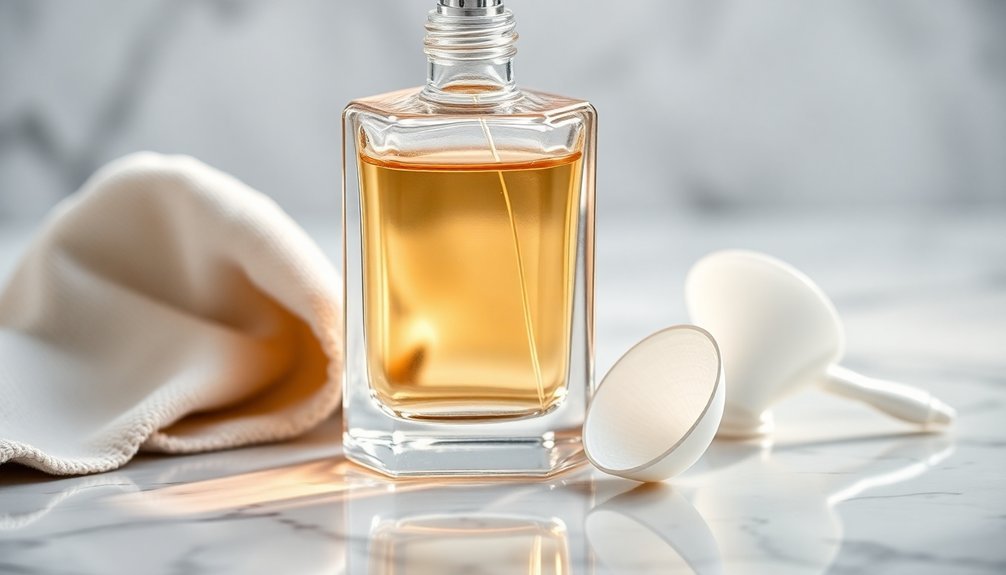
While many people focus on the fragrance itself, understanding how perfume bottles can become contaminated is essential for maintaining your scents. Your perfume bottles are susceptible to bacterial growth due to moisturizing ingredients, which can compromise the fragrance's integrity.
When you don't clean your bottles properly, residual chemicals can react with new scents, creating unwanted fragrance profiles. These reactions often produce volatile organic compounds that pollute indoor air quality.
You'll find that storage conditions play an important role in your perfume's stability. Temperature fluctuations and exposure to light can degrade certain ingredients, particularly aldehydes.
Chemical contaminants from plastic packaging materials may also leach into your fragrances. To protect your perfumes, you'll need to take into account these scientific factors and maintain proper bottle hygiene, as cross-contamination can greatly alter your favorite scents' properties.
Essential Tools for Proper Bottle Cleaning
Your perfume bottle cleaning kit should include basic items like soft cloths, mild soap solutions, and white vinegar mixtures for general cleaning purposes.
You'll need precision tools such as tiny bottle brushes, syringes, and cotton swabs to address intricate parts and hard-to-reach areas.
Natural solutions like uncooked rice can serve as gentle scrubbing agents, offering a safe alternative to harsh chemicals that might damage your bottles. A proper cleaning removes up to 90% of surface oils when using soap-based solutions.
Basic Cleaning Kit Components
To properly clean perfume bottles, you'll need a well-organized cleaning kit with essential tools and solutions.
Start with a mixture of white vinegar and warm water for tackling oily residue, plus gentle detergents for delicate bottles. You'll also want a variety of brushes – bottle brushes for general cleaning, nail polish remover brushes for intricate designs, and silicone or nylon brushes for gentle scrubbing.
Include soft cloths for drying and rice for natural agitation when cleaning hard-to-reach areas. Keep isopropyl alcohol 99% on hand as it's highly effective for removing residue and ensuring thorough drying.
Don't forget to stock up on warm water for thorough rinsing – you'll need it for multiple rinses to guarantee all cleaning agents are removed.
Remember to avoid harsh chemicals like baking soda that could scratch your bottles, and opt for eco-friendly solutions whenever possible.
Precision Tools For Details
Selecting the right precision tools makes a significant difference when cleaning intricate perfume bottles.
You'll need small funnels for precise transfers and specialized brushes to reach tight spaces and decorative patterns. Sharp scissors help you cut through seals cleanly, while tweezers allow you to handle delicate components like springs and balls without contamination.
When dealing with stuck stoppers, you'll want pliers wrapped in a soft cloth to protect the bottle's finish. For stubborn screw caps, try warming them slightly with water to ease removal.
Don't forget compressed air – it's essential for removing ethanol residue and ensuring bottles are completely dry before reuse.
Remember that proper tools not only make cleaning more effective but also help preserve your bottles' integrity for future use.
Natural Cleaning Solutions
Three powerful natural cleaning solutions make perfume bottle maintenance both effective and eco-friendly.
You'll find that white vinegar mixed equally with water dissolves oils effectively, while a gentle rice scrub tackles stubborn residues without scratching your bottles.
For intricate designs, a mild soap solution removes up to 90% of surface oils safely.
To guarantee the best results with these natural cleaners:
- Mix equal parts white vinegar and water for a sustainable, cost-effective solution
- Use rice as a gentle physical scrubber for tough spots, being careful not to apply too much pressure
- Apply soap-based cleaners with a small brush for detailed cleaning, especially in crevices and bottle openings
Always rinse thoroughly with clean water and dry completely to prevent water spots and maintain glass clarity.
Step-by-Step Bottle Sanitization Process
When mixing different perfumes in the same bottle, proper sanitization becomes essential to prevent scent contamination and ascertain the purity of your new fragrance.
Start by gathering your cleaning supplies: gentle dish soap, white vinegar, small brushes, and lint-free cloths.
Empty the bottle completely and rinse it with warm water. Create a solution using tepid water with either soap or vinegar, then let it soak overnight for stubborn residues.
You'll need to scrub thoroughly with a small brush, focusing on areas with lingering scents. Rinse multiple times with clean water to remove all cleaning agents.
For the final step, dry the bottle with a lint-free cloth and ascertain the atomizer is clean and unobstructed.
If needed, use ethanol 96% for deeper disinfection, followed by a thorough rinse.
Understanding Fragrance Residue Impact
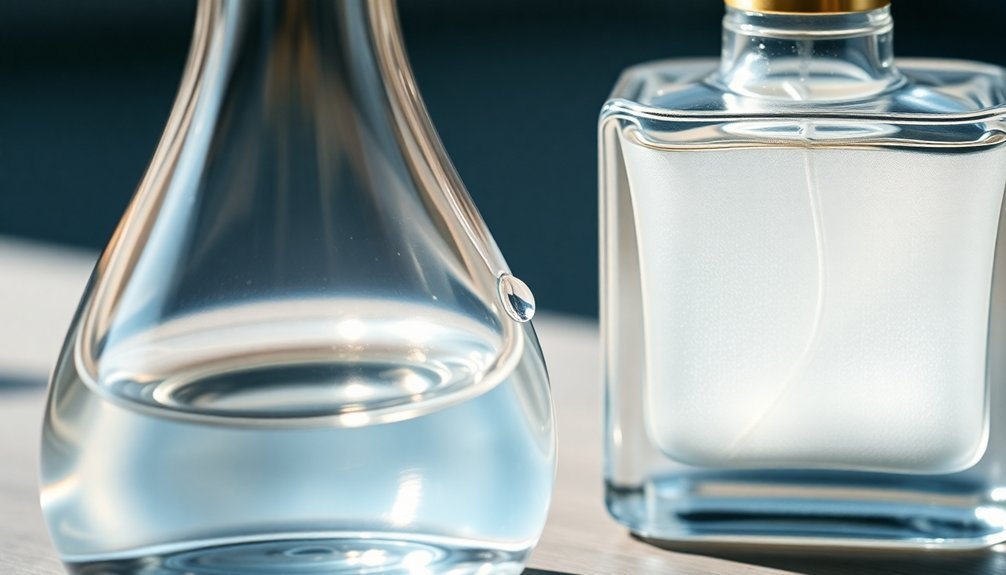
When you mix fragrances in bottles containing residue from previous scents, you're risking unwanted chemical reactions that can alter or degrade your new blend.
Base note contamination from leftover residues can dramatically change your fragrance's foundation, creating an unstable or inconsistent scent profile.
Your scent memory and perception of the new fragrance will be distorted by these residual elements, making it impossible to achieve the pure, intended composition you're seeking.
Chemical Reactions Between Scents
Since fragrances contain complex mixtures of chemicals that can react with one another, understanding how scents interact is essential for maintaining their intended aroma.
When you mix different perfumes without proper cleaning between uses, you risk triggering unwanted chemical reactions that can alter or destroy the fragrances.
Here's what can happen when scents mix:
- Aldehydes from one fragrance may oxidize into carboxylic acids when exposed to residual peroxides from another scent.
- Natural ingredients in one perfume might accelerate chemical reactions in another, leading to unexpected scent changes.
- The ethanol base of one fragrance can convert into acetaldehyde when mixed with peroxides from another perfume's residue.
These reactions aren't just about losing the desired scent – they can also create potentially irritating compounds that might affect your skin.
Base Note Contamination Effects
Base notes form the foundation of a perfume's lasting impression, yet their residue can greatly impact future fragrances if left unchecked in bottles. When you reuse bottles without proper cleaning, these lingering compounds can alter new scents and create unwanted chemical interactions.
You'll find that base note residues build up over time, especially in glass containers, potentially contaminating your fresh fragrances. The effects aren't just cosmetic – these residues can trigger skin allergies, respiratory issues, and other health concerns.
They're particularly problematic because base notes contain complex chemical structures that stick around longer than other fragrance components. If you're mixing different scents, you'll want to be extra cautious since cross-contamination can create unexpected and potentially harmful combinations.
That's why thorough cleaning between uses is essential for maintaining fragrance integrity.
Scent Memory Distortion
Understanding how fragrance residues affect scent memory proves crucial for both perfume enthusiasts and manufacturers. When you don't clean your perfume bottles properly, residual scents can distort your olfactory perception and emotional associations with new fragrances.
This distortion directly impacts your brain's limbic system, which processes scents without filtering through the thalamus.
Here's why scent memory distortion matters:
- Your brain creates strong emotional connections to specific fragrances, and residue can interfere with these memory triggers.
- Leftover scents can alter your mood differently than intended, affecting your overall fragrance experience.
- Brand perception and trust can erode when residual scents mix with new fragrances, creating unexpected combinations.
To protect your scent memories and guarantee authentic fragrance experiences, always clean your bottles thoroughly before introducing new scents.
Preparing Your Workspace for Bottle Cleaning
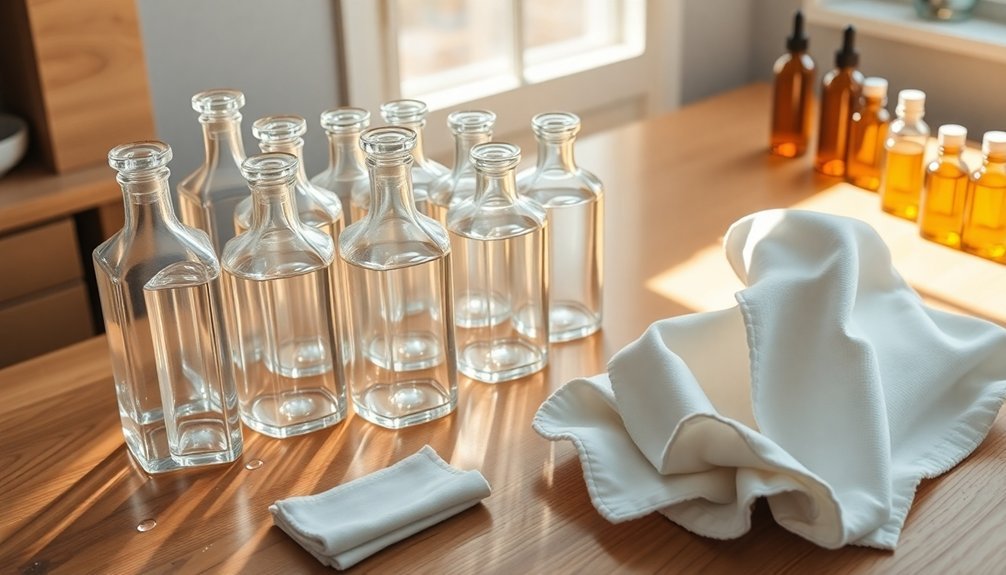
Proper workspace preparation makes all the difference when cleaning perfume bottles. You'll need a clear, flat surface protected by a plastic sheet to prevent any accidental spills from damaging your work area. Gather all your cleaning tools beforehand, including gentle detergents, white vinegar, cotton sticks, and specialized bottle brushes.
| Essential Item | Purpose | Benefits |
|---|---|---|
| Plastic Sheet | Surface Protection | Peace of mind |
| Gentle Detergent | Safe Cleaning | Preserves bottle integrity |
| White Vinegar | Dissolve Residues | Natural and effective |
| Cotton Sticks | Detail Cleaning | Precise results |
| Bottle Brushes | Deep Cleaning | Thorough sanitation |
Remember to maintain proper ventilation and a stable environment temperature while working. Keep your cleaning supplies organized and within reach, and always wear gloves to prevent skin oils from contaminating your cleaned bottles.
Advanced Cleaning Techniques for Vintage Bottles
When you're working with vintage perfume bottles, you'll need to approach cleaning with special attention to historical preservation methods, particularly for maintaining original labels and stoppers.
You can protect antique glass by using a gentle mixture of white vinegar and warm water, which effectively removes residues without compromising the bottle's integrity.
For stubborn buildup in hard-to-reach areas, try the rice-scrubbing technique while being mindful of the bottle's age-related fragility.
Historical Restoration Methods
Restoring vintage perfume bottles requires a delicate balance between preservation and cleanliness.
You'll need to understand the historical context of your bottle to maintain its authenticity while ensuring it's safe for new scents.
Always opt for minimal intervention, using specialized tools like soft brushes and cotton swabs to protect delicate surfaces.
When restoring your vintage perfume bottles, follow these essential steps:
- Start with a gentle inspection to identify fragile areas, paying special attention to original labels and decorative elements.
- Choose mild cleaning agents like diluted white vinegar instead of harsh chemicals that could damage the bottle's integrity.
- Use period-appropriate restoration techniques that align with your bottle's era, ensuring you don't compromise its historical value.
Remember to handle your bottle with care and avoid excessive moisture that could harm original materials.
Antique Glass Protection Tips
Three essential techniques protect antique glass perfume bottles during advanced cleaning.
First, you'll want to stick with soft-bristled brushes and cotton swabs for intricate designs, avoiding harsh scrubbers that could scratch the glass. Don't use alcohol or abrasive chemicals that might damage decorative elements or original labels.
Second, create a gentle cleaning solution by mixing equal parts white vinegar and cold water, or use mild dish soap for stubborn residues. Keep all solutions away from labels and printed materials to preserve their historical value.
Finally, support your bottle firmly while cleaning and let it air-dry to prevent water spots.
Remember to store your cleaned bottles in a dry place away from direct sunlight, and maintain them regularly using these protective measures to extend their lifespan.
Safety Measures During Bottle Preparation
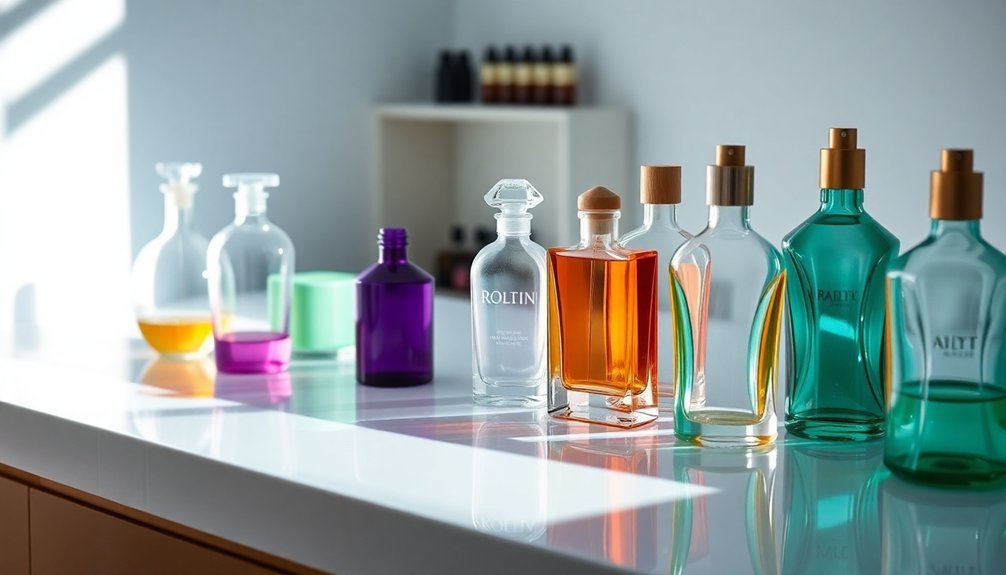
Essential safety precautions must be followed when preparing perfume bottles for reuse.
You'll need to select appropriate cleaning agents that won't damage your bottles – mild dish soap works well for regular cleaning, while white vinegar offers a stronger solution when needed. For sanitization, isopropyl alcohol is perfect for small essential oil bottles.
- Don't use acetone on plastic bottles, as it can cause severe damage to the material.
- Add uncooked rice or salt as a gentle abrasive to help remove stubborn residues.
- Use crumpled newspaper to safely absorb and dispose of waste materials.
Always guarantee proper rinsing to avoid cross-contamination, and let your bottles air dry completely.
Pay special attention to the sprayer and nozzle, keeping them clean and unobstructed for superior performance.
If you're working with crystal or glass bottles, handle them with extra care to prevent scratches.
Preserving Bottle Aesthetics While Cleaning
Beyond basic safety measures, maintaining a perfume bottle's beauty requires careful attention during the cleaning process. You'll want to use gentle cleaning solutions and soft, lint-free cloths to protect the surface from scratches, especially with crystal bottles.
| Cleaning Method | Best Practice |
|---|---|
| Daily Care | Wipe with soft cloth to prevent dust buildup |
| Deep Cleaning | Mix tepid water with gentle dish soap |
| Stubborn Stains | Use equal parts white vinegar and water |
After cleaning, you'll need to polish the exterior to restore its original shine. Remember to avoid abrasive materials and store your bottles in cool, dark places to prevent UV damage. For vintage or intricate bottles, use delicate brushes to reach tight spaces without damaging the surface. Proper drying is essential – position bottles upside down in a ventilated area to guarantee complete moisture evaporation.
Common Mistakes in Perfume Bottle Care
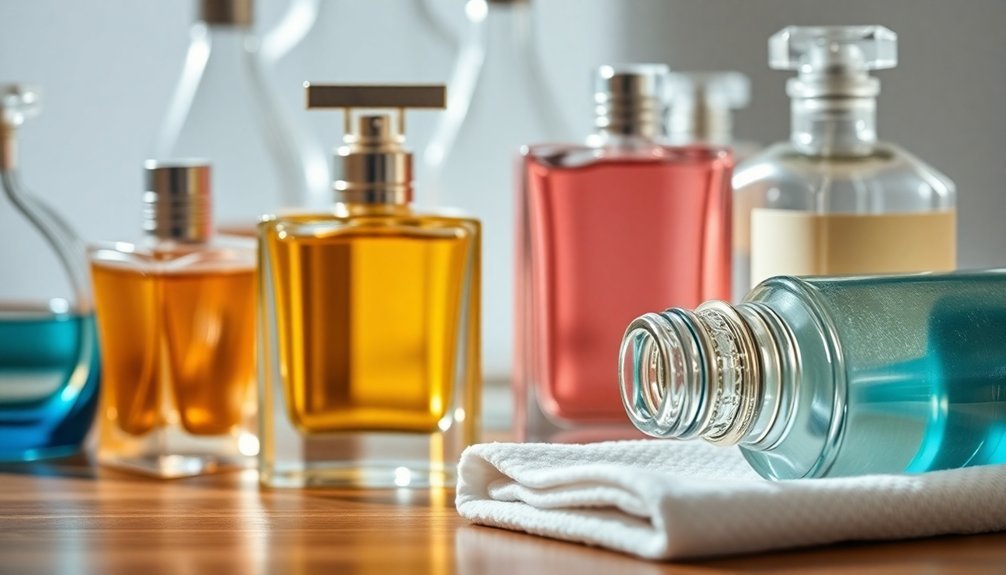
When caring for perfume bottles, many enthusiasts unknowingly make mistakes that can compromise both the fragrance and container.
You'll find that improper storage and handling are the biggest culprits in fragrance degradation. Exposure to direct sunlight, temperature fluctuations, and high humidity can break down your perfume's chemical composition.
- Don't leave bottles uncapped or frequently open them, as air exposure accelerates oxidation.
- Avoid touching the nozzle with your fingers, as oils and bacteria can contaminate the sprayer.
- Never shake the bottles or store them in your purse, as movement disrupts the fragrance composition.
Remember that proper bottle maintenance isn't just about aesthetics – it's essential for preserving your perfume's integrity and ensuring a clean base when you're ready to mix scents.
Effective Drying Methods for Clean Bottles
Three essential factors determine the success of drying perfume bottles: proper positioning, air circulation, and moisture control.
You'll want to place your bottles upside down on clean towels to guarantee thorough drainage. Use wooden dowel racks or wire holders to keep the bottles elevated, allowing air to circulate freely around them.
Keep your bottles in a warm, low-humidity environment, but avoid direct heat sources that could damage the glass. You can speed up the process by using desiccants nearby or gently warming the bottles with a clean cloth.
Before refilling, don't forget to inspect each bottle thoroughly – check for residual moisture, conduct a smell test, and verify the integrity of the glass and sealing mechanisms.
A quick rinse with distilled water will make sure your bottle's ready for its next fragrance.
Testing Bottle Readiness for New Scents
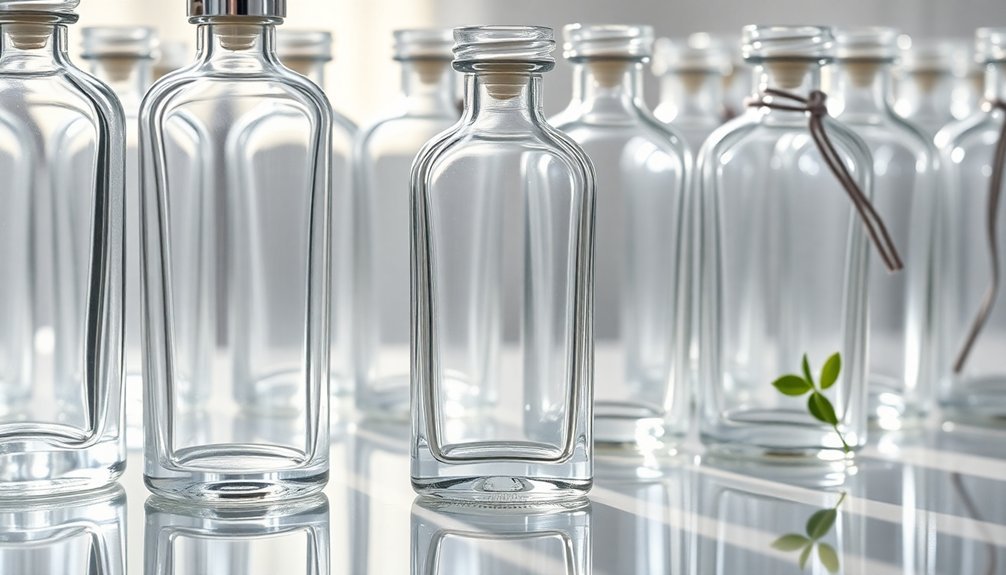
Since perfume bottles can retain subtle traces of previous fragrances, you'll need to perform several essential tests before introducing new scents.
Ascertain you're working in a scent-free environment to accurately assess the bottle's readiness. Check the container for any damage or contamination that might compromise your new fragrance.
To confirm your bottle is truly ready for a new scent, follow these key steps:
- Conduct a neutral aroma test by filling the bottle with pure alcohol and checking for any lingering scents.
- Test the seal integrity by closing the bottle tightly and inverting it to check for leaks.
- Verify material compatibility by examining the bottle's interior for any signs of residue or deterioration.
Remember to document your testing results to maintain quality consistency across your fragrance collection.
Frequently Asked Questions
How Long Should I Wait Between Mixing Different Scents in Bottles?
You'll need to wait at least 1-3 months between mixing different scents to allow proper maturation. Don't rush this process, as it's essential for your fragrances to stabilize and develop their intended characteristics.
Can I Use Boiling Water to Sterilize Decorative Perfume Bottle Caps?
You shouldn't use boiling water on decorative perfume caps as it can damage plastic components and decorative elements. Instead, clean them with warm water and mild soap, or use a 96% ethanol solution.
What's the Shelf Life of Mixed Custom Perfumes in Cleaned Bottles?
Your custom-mixed perfumes typically last 2.5-5 years for natural ingredients and up to 10 years for synthetic ones. You'll get the best shelf life by storing them in cool, dark places with tight seals.
Do Crystal Perfume Bottles Require Special Cleaning Products or Techniques?
Yes, you'll need special care for crystal bottles. Use a white vinegar solution, soft brushes, and cotton swabs. Don't use harsh chemicals or abrasives, and always dry with lint-free cloths to protect the crystal.
Can Weather Conditions Affect the Cleaning and Mixing Process of Perfumes?
Yes, you'll find that temperature and humidity directly affect your perfume mixing process. High heat can speed up evaporation during cleaning, while humidity changes how scents blend and settle in your bottles.
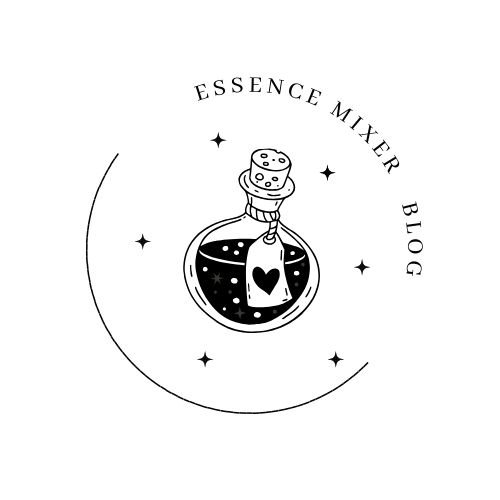
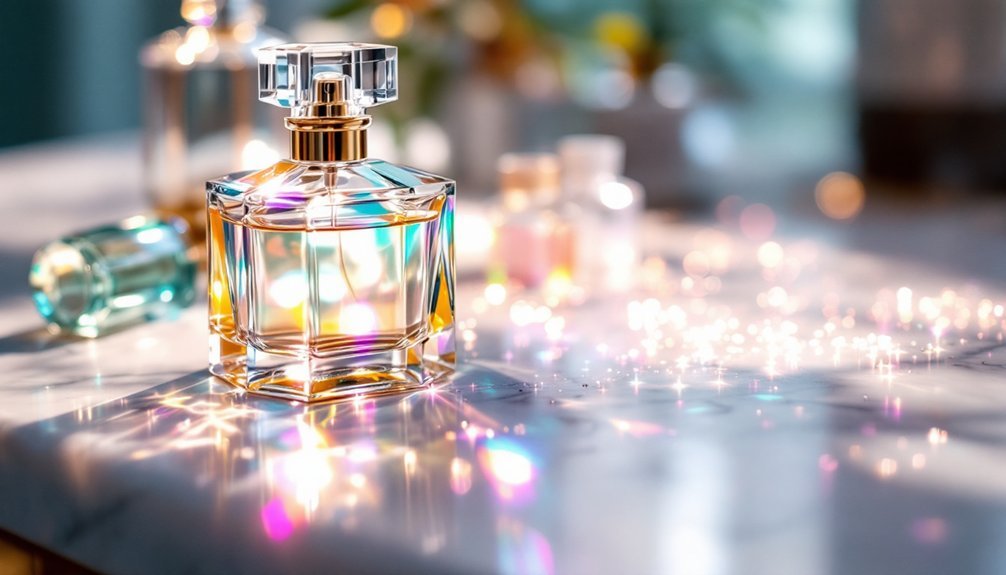
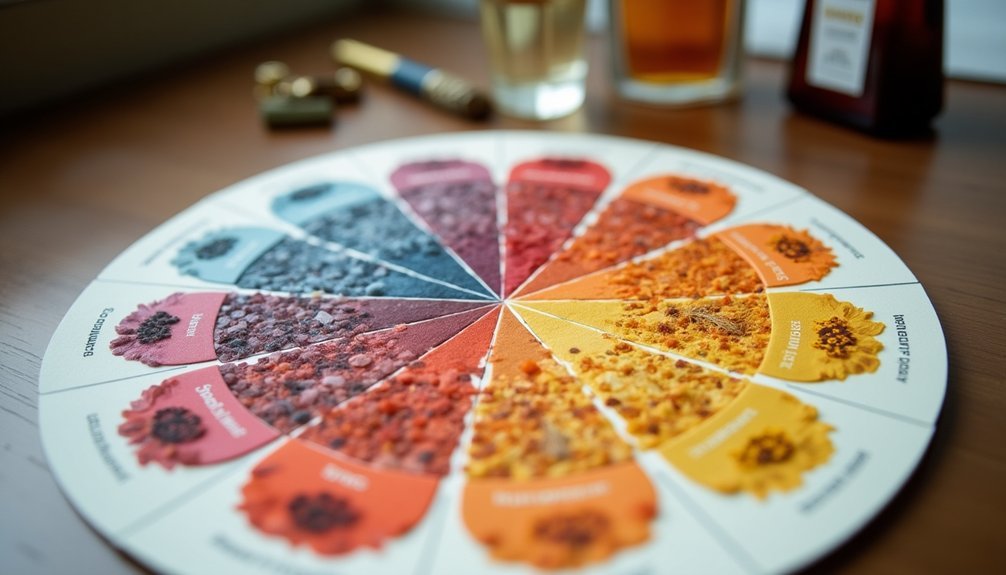
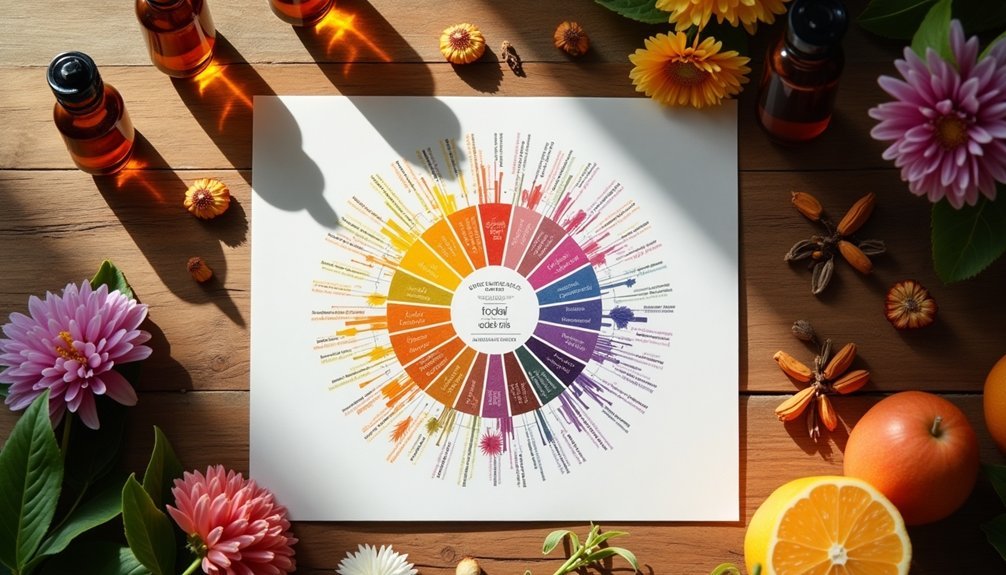
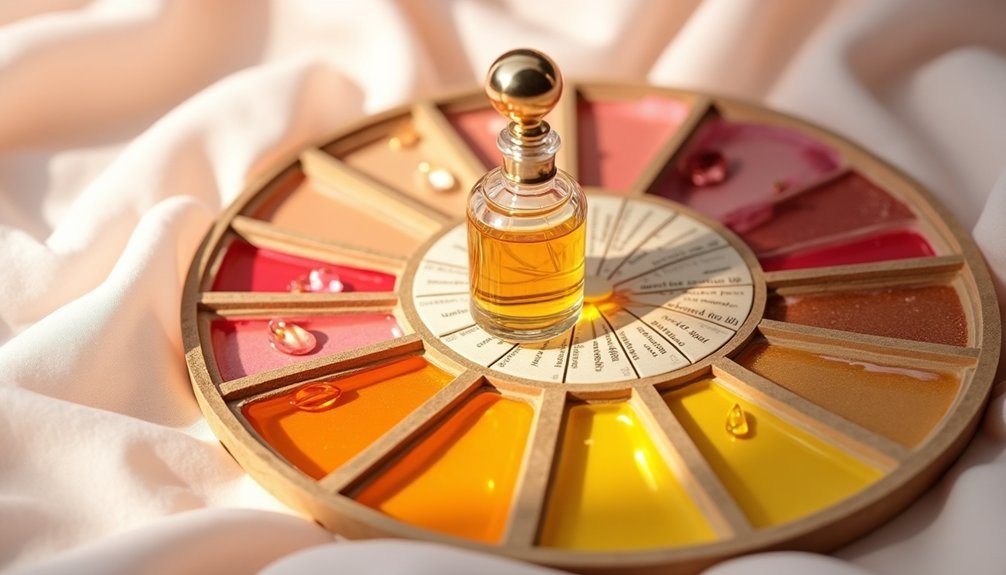
Leave a Reply